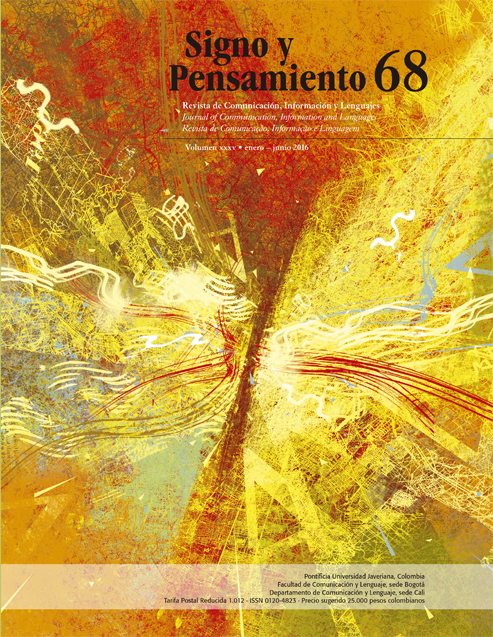Abstract
The transformations of the mass media and the emergence of new media have generated new social practices. The object of study of this work is the digitization of political discourse. We will use tools of socio-semiotics, of political theory and mediatization theory and convergence. The corpus is formed by the accounts of the candidates for president in the argentine election of 2011. We aim to detail the ways of the inclusion of political discourse in social networks. We hold as a hypothesis that the uses of the politicians of the social networks are framed in the political developments and imply logics of different media. We call them “media strategies”. Taking into account the tools of the Twitter interface, the interaction with the mass media and also those from the world of politics, we will conclude in emphasizing the emergence of four types of strategies.
Beas, D. (2011). La reinvención de la política. Internet y la nueva esfera pública. Buenos Aires. Planeta.
Carlón, M. (2014). ¿Del arte contemporáneo a una era contemporánea? En M. C. Reviglio y F. Rovetto (Comps.), CIM. Estado actual de las investigaciones sobre mediatizaciones (pp. 24-41). Rosario: UNR Editora. Recuperado de http://www.cim.unr.edu.ar/archivos/ cuadernodelcim2.pdf
Carlón, M. (2013). Contrato fundacional, poder y mediatización: noticias desde el frente sobre la invasión a YouTube, campamento de los bárbaros. Matrizes, Revista do Programa de Pós-Graduação em Ciências da Comunicação da Universidade de São Paulo, 7. Recuperado de http://www.matrizes.usp.br/index.php/ matrizes/article/view/433
Carlón, M. (2012). En el ojo de la convergencia. Los discursos de los usuarios de Facebook durante la transmisión televisiva de la votación de la ley de matrimonio igualitario. En M. Carlón y A. Fausto Neto (Comps.), Las políticas de los internautas. Nuevas formas de participación (pp. 173-194). Buenos Aires: La Crujía.
Carlón, M. y Scolari, C. (Eds.) (2009). El fin de los medios masivos. El comienzo de un debate. Buenos Aires: La Crujía.
Carlón, M. y Fausto Neto, A. (Comps.) (2012). Las políticas de los internautas. Nuevas formas de participación. Buenos Aires: La Crujía. Castells, M. (2009). Comunicación y poder. Madrid: Alianza Editorial.
Cheresky, I. (2013). Las elecciones argentinas en perspectiva comparada. Debate, 5(2), 16-43. Cheresky, I. (Comp.) (2006). La política después de los partidos. Buenos Aires: Prometeo.
Cheresky, I. y Annunziata, R. (Comps.) (2012). Sin programa, sin promesa. Liderazgos y procesos electorales en Argentina. Buenos Aires: Prometeo.
Dader, J. (2003). Ciberdemocracia y comunicación política virtual: el futuro de la ciudadanía electrónica tras la era de la televisión. En S. Berrocal (Coord.), Comunicación política en televisión y nuevos medios (pp. 309-342). Barcelona: Ariel.
Diz, M. L. (2014). Los liderazgos políticos y sus dilemas en el presente de Argentina y Chile. Postdata, 19(1), 229-241.
Espino-Sanchez, G. (2014). La política en internet, ¿de la mediatización a la convergencia digital? Convergencia, 21(65), 39-63.
Fernández, J. L. (Coord.) (2014). Postbroadcasting. Innovación en la industria musical. Buenos Aires: La Crujía.
Hernández Mirón, J. L. (2010). Microrrelato y posmodernidad. AnMal Electrónica, 29.
Jenkins, H. (2008). Convergence Culture. La cultura de la convergencia de los medios de comunicación. Barcelona: Paidós Comunicación.
Lacalle, C. (2012). Elecciones catalanas y web 2.0. En M. Carlón y A. Fausto Neto (Comps.), Las políticas de los internautas. Nuevas formas de participación (pp. 117-135). Buenos Aires: La Crujía.
Mancera Rueda, A. y Pano Alamán, A. (2013). Nuevas dinámicas en la comunicación política en Twitter. Círculo de Lingüística Aplicada a la Comunicación, 56 , 53-80.
Rosanvallon, P. (2011). La contrademocracia. La política en la era de la desconfianza. Buenos Aires: Manantial.
Scolari, C. (2008). Hipermediaciones. Elementos para una teoría de la Comunicación Digital Interactiva. Barcelona: Gedisa.
Sarlo, B. (2011). La audacia y el cálculo. Kirchner 2003-2010. Buenos Aires: Sudamericana. Slimovich, A. (2012). El Facebook de los gobernantes. El caso de Cristina Fernández de Kirchner y de Mauricio Macri. En M. Carlón y A. Fausto Neto (Comps.), Las políticas de los internautas. Nuevas formas de participación (pp. 137-154). Buenos Aires: La Crujía.
Slimovich, A. (2014). El discurso macrista en twitter: un análisis sobre la campaña para la reelección del Jefe de Gobierno de Buenos Aires. Revista de Estudios Políticos y Estratégicos, 2(1). Recuperado de http://vtte.utem. cl/wp-content/themes/blogum/revista_epe/Rev_estudios_politicos_estrategicos_vol2_ n1_2014_todo.pdf
Verón, E. (1998 [1995]). Mediatización de lo político. En G. Gauthier, A. Gosselin y J. Mouchon (Comps.), Comunicación y Política (pp. 220-236). Barcelona: Gedisa.
Verón, E. (2001). El cuerpo de las imágenes. Buenos Aires: Norma. Verón, E. (2012). Prólogo. La mediatización, ayer y hoy. En M. Carlón y A. Fausto Neto (Comps.), Las políticas de los internautas. Nuevas formas de participación (pp. 9-15). Buenos Aires: La Crujía.
Verón, E. (2013). La semiosis social, 2. Ideas, momentos, interpretantes. Buenos Aires: Paidós.
Warnick, B. y Heineman, D. (2012). Rhetoric Online. The Politics of New Media. New York: Peter Lang Publishing.
This journal is registered under a Creative Commons Attribution 4.0 International Public License. Thus, this work may be reproduced, distributed, and publicly shared in digital format, as long as the names of the authors and Pontificia Universidad Javeriana are acknowledged. Others are allowed to quote, adapt, transform, auto-archive, republish, and create based on this material, for any purpose (even commercial ones), provided the authorship is duly acknowledged, a link to the original work is provided, and it is specified if changes have been made. Pontificia Universidad Javeriana does not hold the rights of published works and the authors are solely responsible for the contents of their works; they keep the moral, intellectual, privacy, and publicity rights.
Approving the intervention of the work (review, copy-editing, translation, layout) and the following outreach, are granted through an use license and not through an assignment of rights. This means the journal and Pontificia Universidad Javeriana cannot be held responsible for any ethical malpractice by the authors. As a consequence of the protection granted by the use license, the journal is not required to publish recantations or modify information already published, unless the errata stems from the editorial management process. Publishing contents in this journal does not generate royalties for contributors.


